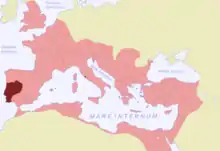Lusitania
See also: lusitania and Lusitânia
English
Pronunciation
- IPA(key): /luːsɪˈteɪnɪə/
- Rhymes: -eɪniə
Proper noun
Lusitania
Derived terms
Translations
ancient Roman province
Latin
Etymology
From Lusitanus + -ia, named after the Lusitanians, a Proto-Indo-European tribe of the Iberian peninsula (from a pre-Roman substrate of Iberia). The name's origin is uncertain but it is generally agreed that the tribe converged with a heavy Celtic (possibly Celtiberian) influence.

The province within the Roman Empire
Pronunciation
- (Classical) IPA(key): /luː.siˈtaː.ni.a/
Proper noun
Lūsitānia f (genitive Lūsitāniae); first declension
- A province of Roman Hispania, covering what is now southern Portugal and parts of western Spain such as Extremadura.
Inflection
Alternatively, the second syllable can be written long as Lūsītānia. First declension, with locative.
| Case | Singular |
|---|---|
| Nominative | Lūsitānia |
| Genitive | Lūsitāniae |
| Dative | Lūsitāniae |
| Accusative | Lūsitāniam |
| Ablative | Lūsitāniā |
| Vocative | Lūsitānia |
| Locative | Lūsitāniae |
Related terms
- Lūsitānī
- Lūsitānus
Descendants
- English: Lusitania
References
- Lusitania in Charlton T. Lewis and Charles Short (1879) A Latin Dictionary, Oxford: Clarendon Press
- Lusitania in Gaffiot, Félix (1934) Dictionnaire Illustré Latin-Français, Hachette
- Koch, John T (2011). Tartessian 2: The Inscription of Mesas do Castelinho ro and the Verbal Complex. Preliminaries to Historical Phonology. Oxbow Books, Oxford, UK. pp. 33–34. →ISBN.
This article is issued from Wiktionary. The text is licensed under Creative Commons - Attribution - Sharealike. Additional terms may apply for the media files.